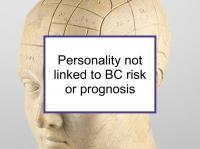The theory that there is a "cancer personality" that increases breast cancer risk and reduces survival has been circulating in popular culture for decades. Books such as The Type C Connection: The Behavioral Links to Cancer and Your Health (1992) have been followed by more recent books such as Healing the Cancer Personality (2013).
However, while there is some limited evidence linking extremely severe stress and breast cancer risk, researchers generally have found no significant associations between personality traits and breast cancer risk or prognosis. Now a new study has again found no significant associations between personality and breast cancer risk or survival.
There is no cancer personality
As noted above, the theory that there is a cancer personality that predisposes women to breast cancer has not been borne out in the numerous studies that have been undertaken to study it. The following personality traits have been ruled out as contributing to the risk of developing breast cancer:
- Depression
- Emotional repression
- Chronic anxiety
- Neuroticism
- Introversion or extraversion
- Anti-emotionality (an absence of emotional behavior or a lack of trust in one’s own feelings)
- Anger control (whether a lack of control or too much control)
- Hostility or Type A behavior
- Psychoticism
- Cynical distrust
- Dishonesty
- Agreeableness
- Conscientiousness
- Style of coping behavior
- Openness to experience
- Joint effect of personality traits making up a proposed "cancer personality" (variously described, but typically including passive, emotionally inexpressive, conforming and unassertive traits).
Latest research finds personality and breast cancer not linked
The prospective study referenced at the beginning of this news story was designed to investigate whether personality is associated with breast cancer risk or survival. The study included 15,107 Japanese women aged 40 to 64 who completed the Eysenck Personality Questionnaire-Revised (EPQ-R) Short Form at enrollment. The women, who were cancer-free initially, were followed from 1990 to 2007.
Study participants were divided into quartiles for each EPQ-R subscale (extraversion, neuroticism, psychoticism, and lie) based on their scores. The analysis for each subscale was computed using the lowest quartile as reference. No association was found between any of the four personality subscales and breast cancer risk.
To investigate whether personality influences survival after breast cancer, the authors followed 250 of the women who developed breast cancer from diagnosis through 2008. A total of 45 of these women died during follow up (this included deaths from all causes, not just breast cancer). No significant associations were found between any of the personality subscales and risk of death. Women with a higher score of extraversion tended to have a lower risk of death, although this result was not statistically significant. The authors also performed the analyses excluding the 32 women diagnosed during the first three years of follow up. However, this did not essentially change the results with respect to either breast cancer risk or survival.
The authors conclude that personality does not appear to significantly impact the development or progression of breast cancer.
